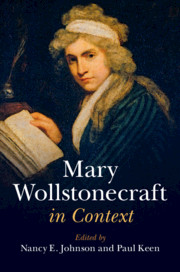Book contents
- Mary Wollstonecraft in Context
- Mary Wollstonecraft in Context
- Copyright page
- Contents
- Illustrations
- Notes on Contributors
- Preface
- Frontispiece
- Chronology
- Part I Life and Works
- Part II Critical Fortunes
- Part III Historical and Cultural Contexts
- The French Revolution Debate
- The Rights of Woman Debate
- Philosophical Frameworks
- Legal and Social Culture
- Literature
- Chapter 30 Sentimentalism and Sensibility
- Chapter 31 English Jacobin Novels
- Chapter 32 Anti-Jacobin Novels
- Chapter 33 Children’s Literature
- Chapter 34 Gothic Literature
- Chapter 35 Travel Writing
- Chapter 36 History Writing
- Chapter 37 Periodicals
- Chapter 38 Translations
- Suggested Further Reading
- Index
Chapter 36 - History Writing
from Literature
Published online by Cambridge University Press: 16 January 2020
- Mary Wollstonecraft in Context
- Mary Wollstonecraft in Context
- Copyright page
- Contents
- Illustrations
- Notes on Contributors
- Preface
- Frontispiece
- Chronology
- Part I Life and Works
- Part II Critical Fortunes
- Part III Historical and Cultural Contexts
- The French Revolution Debate
- The Rights of Woman Debate
- Philosophical Frameworks
- Legal and Social Culture
- Literature
- Chapter 30 Sentimentalism and Sensibility
- Chapter 31 English Jacobin Novels
- Chapter 32 Anti-Jacobin Novels
- Chapter 33 Children’s Literature
- Chapter 34 Gothic Literature
- Chapter 35 Travel Writing
- Chapter 36 History Writing
- Chapter 37 Periodicals
- Chapter 38 Translations
- Suggested Further Reading
- Index
Summary
In the Vindication of the Rights of Men, the first published response to Edmund Burke’s Reflections on the Revolution in France, Mary Wollstonecraft imagines a scene in an uncertain future when London will be in ruins. “The time may come,” she observes, “when the traveler may ask where proud London stood? When its temples, its laws, and its trade, may be buried in one common ruin, and only serve as a byword to point a moral, or furnish senators, who wage a wordy war, on the other side of the Atlantic, with tropes to swell their thundering bursts of eloquence.”1 The passage dismisses the Latinate diction and classical citations that characterize Burke’s work, and locates the movement of history toward the Americas, where new progressive societies will draw their morals from an old society in decline, much as Britain had taken Rome as its model. The passage thus sits uneasily in a work dedicated to the inevitable improvement of society through the progress of reason. Not everything will improve, Wollstonecraft implies, and some societies out of step with the march of reason may even fall into ruin. The moment thus reveals a tenuous ambivalence in Wollstonecraft’s belief in progress, an ambivalence that runs through Wollstonecraft’s thinking about history and historical process. The episode also shows Wollstonecraft working in what we might call the future perfect mode, in which she looks back from the vantage point of an unspecified later time to evaluate her own ongoing present. Wollstonecraft’s concern with progress and her belief in a better future means that she writes of the past always with an eye to the future and the anticipated norms of later times. This chapter will suggest that the evaluation of the present from the vantage of the future and the tensions that shadow her belief in progress are closely related and salient features of Wollstonecraft’s historical writing.
- Type
- Chapter
- Information
- Mary Wollstonecraft in Context , pp. 305 - 313Publisher: Cambridge University PressPrint publication year: 2020



